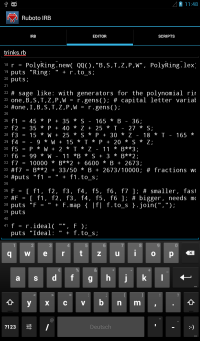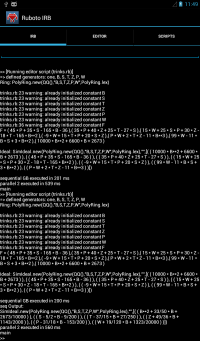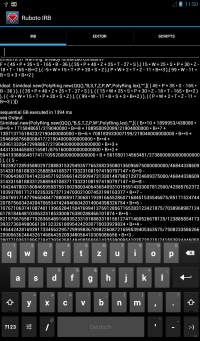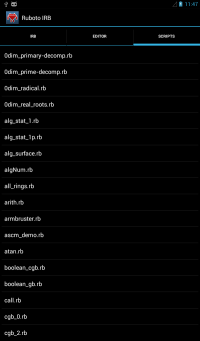Download, installation and unit tests
Download jar-files or clone repository
This is JAS version: jas-2.7,
subversion revision: 200 (export at 2023-07-04).
The JAS classes jar-file
jas-2.7.200-bin.jar
can be used the same way as any other Java archive during
compilation and execution of your Java programs.
It is compiled using Java 11 from OpenJDK.
The bytecode is dual licenced also under the Apache 2.0 licence
to allow usage in Android projects.
The source code is in
jas-2.7.200-src.zip
current version should compile on Java 8 and 11 (aka Java 1.8 and 1.11).
(right click on the link and chose "save link as")
The Javadoc API documentation is in
jas-2.7.200-doc.zip
for current version.
A JAS Maven compatible repository is at
http://krum.rz.uni-mannheim.de/maven-repository/ and at
https://repo1.maven.org/maven2/de/uni-mannheim/rz/krum/.
groupId: de.uni-mannheim.rz.krum, artifactId: jas,
version (for example): 2.7.200.
The JAS Git repository is available with
git clone http://krum.rz.uni-mannheim.de/jas.git jas
or from GitHub
git clone https://github.com/kredel/java-algebra-system jas
Required libraries:
lib/log4j-api.jar,
lib/log4j-core.jar
(from Apache Log4j version 2.17.1),
lib/junit-4.12.jar,
lib/hamcrest-core-1.3.jar
(from Junit 4),
In case you already have these jars, just ensure they are in the
correct location (e.g. ../lib/) or in the class path or accessible via Maven.
The jar libraries can be downloaded from the above links or
with the Ivy "resolve" target of ant, or the Maven dependencies,
when installing the JAS source code.
Optional libraries and files:
- There is a docker specification to create
a docker image containing a runnable JAS in Dockerfile.
- A Debian package libjas-java,
an inofficial Debian package which can be used with MathLibre
jas-java_2.7.200-all.deb,
and an Ubuntu package
libjas-java
are also avalilable.
- jas-mpj.jar
This JAR contains
implementations of distributed Gröbner bases using the
MPJ middle-ware (MPI Java). It requires an MPJ implementation such as
MPJ Express or
FastMPJ.
The Javadocs can be found here.
- jas-mpi.jar
This JAR contains
implementations of distributed Gröbner bases using the
Open-MPI middle-ware (with Java support). It requires an MPI implementation
such as Open-MPI.
The Javadocs can be found here.
- jas-meditor.jar
This JAR contains the interface for JAS as an meditor engine,
see jscl-meditor.
Sample script to call meditor with the JAS engine
meditor.
- jlinalg_adapter.jar
This JAR contains an adapter for JAS to the linear algebra library
JLinAlg version 0.6.
The Javadocs can be found here.
- commons-math_adapter-bin.jar
This JAR contains an adapter for JAS to the Apache Commons Math 3.3
linear algebra library
Commons-Math
version 3.3.
- jas-jython.jar
This JAR contains a scripting interface to use the
jython
interpreter with JAS.
- Android JAS App
Ruboto-IRB_with_JAS.
You must allow "installation from untrusted sources".
The JAS App uses its JRuby scripting interface and runs within the Ruby IRB Android App
Ruboto.
For latest developments see JAS Weblog
and the Git change log.
Installation
Add the JAS jar-file and the other required jar-files
to the classpath. Start using it in your applications.
For example
javac -classpath log4j-api-2.17.1.jar:log4j-core-2.17.1.jar:junit.jar:jas.jar:. -d . src/edu/jas/application/Examples.java
java -classpath log4j-api-2.17.1.jar:log4j-core-2.17.1.jar:junit.jar:jas.jar:. edu.jas.application.Examples
Make sure that you use the actual jars as described above, for example
log4j-api-2.17.1.jar:log4j-core-2.17.1.jar:junit-4.12.jar:hamcrest-core-1.3.jar
If you want to develop with JAS, then extract the
jar-file in a new directory
jar -xvf jas-[version]-src.jar
JAS is currently developed for Java 11 (OpenJDK).
It may eventually not compile under Java 8 (OpenJDK 1.8).
It will no more compile under Java 6 (OpenJDK 1.6)
or older versions.
Among the extracted files, there is an Ant build script
build.xml
and also a Gnu make file
Makefile.
To use Ant, you must edit the build.xml file and
adjust the lib property to point to the directory
where you downloaded the jar files.
Also be sure to use the correct JDK version, e.g. via setting the
JAVA_HOME environment variable.
To use the Gnu make file, you must edit the Makefile
and adjust the JDK and the LIBPATH variables.
Most useful Ant targets:
ant resolve fetch the required libraries (log4j2, junit) with Ivy,
ant compile changed Java files are compiled,
ant recompile all Java files are compiled,
ant test run all JUnit tests,
ant run -Dclass=edu.jas.'package'.'class' run the respective class,
ant clean remove backup files,
ant distclean remove all class files,
ant doc create the Javadocs.
Most useful make-file targets:
make "class" run the main() method of the class,
e.g. make edu.jas.poly.Examples run
the class Examples.
Unit tests with JUnit
Unit tests can be run with the "test" target for ant, e.g.
ant test
The output of the unit tests is collected in the directory
test for inspection.
The test units work mainly with generated random polynomials.
The parameters are choosen such that the resulting Groebner bases
are not to hard to compute.
However some random polynomials may be to big and the running time
may occasionally be several minutes (but not hours).
On the other hand random polynomials may sometimes be zero or one.
If such input does not make sense the test will fail. I.e. some
tests will fail from time to time, but not for repeated execution
of the test. So if a test fails rerun the test a few times.
The JAS documentation is contained in the jar files
jas-[version]-src.jar and jas-[version]-doc.jar.
Extract the jar files and start exploring with any browser
from the index.html file in the main directory.
The JAS javadoc API documents and the jython documents
can also be browsed online:
API Javadocs,
Epydoc of jas.py and
Rdoc of jas.rb.
README and licencing:
COPYING.jas (GPL)
or
COPYING.lgpl.jas (LGPL)
JAS uses Apache Log4j
to track progress in computations and
inform about problematic or erroneous program states.
Since JAS 2.6 it uses Log4j 2.x.
The configuration is in file log4j2.properties.
Per deault the logging level is at ERROR so that only minimal
logs are produced.
To obtain more detailed information or store the logs to files,
please configure the desired properties in the above file.
This configuration file is no more contained in the binary jars
jas-bin.jar or jas-[version].jar to allow
usage of other compatible logging frameworks.
The old configuration of Log4j version 1 via
BasicConfigurator.configure() is no more supported.
Usage with the Eclipse IDE
The JAS source distribution can also be compiled and used from the
Eclipse integrated development environment.
Instructions to install the JAS source:
- Download the JAS source jar and unpack to some directory,
or git clone the repository to some directory
- Download the Log4j2 and the Junit jar files
- Start eclipse
- Create a new project from "existing source"
- Specify the source directory
src contained the directory from 1.
- Add the jars from 2. to the project libraries as "external JARs"
- Create a new project or use your default project
- In the project properties add as "required project"
the JAS project from 4.
Instructions to install the JAS binary:
- Download the JAS binary jar file
- Download the Log4j2 and the Junit jar files
- Start eclipse
- In your projects properties add the jar files
from 1. and 2. to the project libraries as "external JARs"
Create and edit a sample java programm which uses the JAS API.
E.g. the following sample computes the first ten Legendre polynomials.
import java.util.List;
import java.util.ArrayList;
import edu.jas.arith.BigRational;
import edu.jas.poly.GenPolynomial;
import edu.jas.poly.GenPolynomialRing;
public class mytests {
public static void main(String[] args) {
BigRational fac = new BigRational();
String[] var = new String[]{ "x" };
GenPolynomialRing<BigRational> ring
= new GenPolynomialRing<BigRational>(fac,1,var);
int n = 10;
List<GenPolynomial<BigRational>> P
= new ArrayList<GenPolynomial<BigRational>>(n);
GenPolynomial<BigRational> t, one, x, xc;
BigRational n21, nn;
one = ring.getONE();
x = ring.univariate(0);
P.add( one );
P.add( x );
for ( int i = 2; i < n; i++ ) {
n21 = new BigRational( 2*i-1 );
xc = x.multiply( n21 );
t = xc.multiply( P.get(i-1) ); // (2n-1) x P[n-1]
nn = new BigRational( i-1 );
xc = P.get(i-2).multiply( nn ); // (n-1) P[n-2]
t = t.subtract( xc );
nn = new BigRational(1,i);
t = t.multiply( nn ); // 1/n t
P.add( t );
}
for ( int i = 0; i < n; i++ ) {
System.out.println("P["+i+"] = " + P.get(i) );
}
}
}
Using the Jython interpreter
Be sure you have downloaded the above libraries
log4j-api.jar, log4j-core.jar, junit-4.12.jar, hamcrest-core-1.3.jar,
and jas*-bin.jar.
JAS-jas-2.7 is using and has been tested with Jython 2.7.0.
The main file to interface to the JAS library is
jas.py.
It must be imported by other Python files.
HTML documents of the interface can be found
here.
Start using JAS, e.g.
jython -J-cp log4j-api.jar:log4j-core.jar:junit-4.12.jar:hamcrest-core-1.3.jar:. examples/trinks.py
The
examples/trinks.py
contains an Groebner base example named after its proposer Mr. Trinks.
The file runs a sequential, a parallel and a distributed version
of the Groebner base algorithms.
For further discussion of the JAS jython interface
see
User guide.
Using the JRuby interpreter
Be sure you have downloaded the above libraries
log4j-api.jar, log4j-core.jar, junit-4.12.jar, hamcrest-core-1.3.jar,
and jas*-bin.jar.
JAS-jas-2.7 is using and has been tested with JRuby 1.7.23 (Ruby 1.9.3 compatible)
The main file to interface to the JAS library is
jas.rb.
It must be required by other Ruby files.
HTML documents of the interface can be found
here.
Start using JAS, e.g.
jruby -J-cp log4j-api.jar:log4j-core.jar:junit-4.12.jar:hamcrest-core-1.3.jar:. examples/trinks.rb
The
examples/trinks.rb
contains an Groebner base example named after its proposer Mr. Trinks.
The file runs a sequential, a parallel and a distributed version
of the Groebner base algorithms.
For further discussion of the JAS scripting interface
see
User guide.
Using the Ruboto-IRB-JAS Android application
The App has been developed for JAS version 2.5 on Android 5 and is
not working on current Android versions (since 2019).
Be sure you have installed the above Android application package
ruboto-irb-jas-release.apk.
It contains all required libraries and scripts.
JAS-2.5 has been tested with Android 2.3 and 4.1 and is using
JRuby 1.6.4 (Ruby 1.8.7 & 1.9.2 compatible)
The JAS app uses the Ruby IRB Ruboto for Android.
This is just a Ruby interpreter running on Android together with a text editor.
So all JAS JRuby scripts can be run in this environment.
The JAS Java programs are included in compiled and transformed Dalvik "dex" format.
Up to now, no functional problems have been encountered, i.e. all JAS Java code runs.
However, due to limitations in CPU speed and memory on mobile phones or tablets
eventually not all examples and problems will execute.
In 2012, comparison of a two year old Android tablet (1 GHz, 0.5 GB)
and a three year old PC (3 GHz, 4 GB) show that the examples run
about 5 times slower than on the PC.
The main Ruboto screen with the "trinks.rb" example and its output looks as follows.
Also the arbitrary precision numbers arithmetic works on Android.



The list of examples can be accessed via the "scripts" button.

For further discussion of the JAS scripting interface
see
User guide.
Heinz Kredel
Last modified: Mon May 30 10:33:32 CEST 2022



